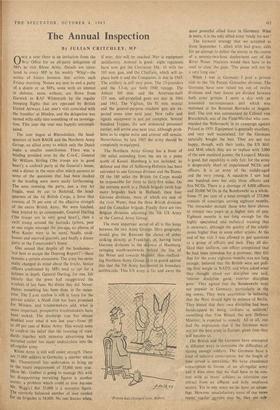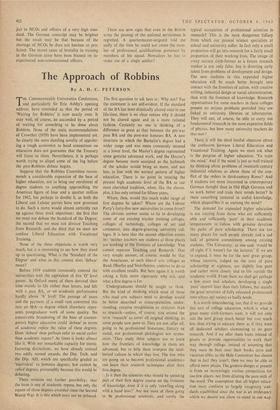The Annual Inspection
By.JULIAN CRITCHLEY, MP ONCE a year there is an invitation from the War Office for an all-party delegation of MPs to visit Rhine Army. Details are circu- lated to every MP in his weekly 'Whip'—the notice of future business that arrives each Friday morning. Names are sent in and a party of a dozen or so MPs, some with an interest in defence, some without, are flown from Gatwick to RAF Wildenrath by the regular trooping flights that are operated by British United Airways. Last year's visit coincided with the 'troubles' at Minden, and the delegation was turned willy-nilly into something of an investiga- tion. This year the visit was happily uncompli- cated.
The tour began at Rheindahlen, the head- quarters of both BAOR and the Northern Army Group, an allied army to which only the Dutch make a smaller contribution. There was a briefing presided over by the C-in-C, General Sir William Stirling ('the troops are in good heart), a cocktail party at the General's house, and a dinner in the mess after which answers to some of the questions that had been ducked at the briefing were more easily forthcoming. The next morning the party, just a tiny bit fragile, went by car to Bielefeld, the head- quarters of the 1st British Corps, a force that consists of 70 per cent of the effective strength of the entire British Army. We were lunched, then briefed by i.ts commander, General Darling ('the troops are in very good heart), then a swift tramp around the barracks (where, peer as one might amongst the pin-ups, no photos of Miss Keeler were to be seen); Naafis, cook- houses and married quarters, and finally a dinner party at the Commander's house.
One sensed that despite all the bonhomie— 'out here to escape the Denning Report?'—there remains a certain uneasiness. The army has never really changed its mind about the frocks. Senior officers confronted by MPs tend to opt for a defence in depth. General Darling, for one, felt bitterly that the press had exaggerated the troubles of last June. No doubt they did. Never- theless something has been done in the mean- time. The 2 a.m. curfew is still in force for the private soldier, a Naafi club has been promised for Minden, and troublemakers and, what is more important, prospective troublemakers have been sacked. The discharge rate has almost doubled over what it was last year—from .05 to .09 per cent of Rhine Army. This would seem to confirm the belief that the lowering of stan- dards together with intensive advertising had recruited rather too many undesirables into the all-regular army.
Rhine Army is still well under strength. There are 51,000 soldiers in Germany, a number which Mr. Thorneycroft has undertaken to bring up to the treaty requirement of 55,000 next year. (How Mr. Godber is going to manage this with his disappointing recruiting figures is another matter, a problem which could in time become Mr. VVigg's.) But 55,000 is a nonsense figure. The correctly balanced number of men needed for six brigades is 58,000. No one knows when, if ever, this will be reached. Nor is equipment satisfactory. Armour is good: eight regiments have now got the Centurion Mk. 10 with the 105 mm. gun, and the Chieftain, Which will re- place both it and the Conqueror, is due in 1965.
The artillery is still very poor. The 25-pounders and the 5.5-in, are both 1940 vintage. The Abbott 105 mm. and the American-built 175 mm. self-propelled guns are due in 1964 and 1965. The Vigilant, the 81 mm. mortar and the general-purpose machine gun are ex- pected some time next year. New radio and signals equipment is not yet complete. Several hundred Trojans, the new armoured personnel carrier, will arrive also next year, although prob- lems as to engine noise and armour still remain. Nevertheless, by late 1965 the army should be completely re-equipped.
The Northern Army Group has a front of 180 miles extending from the sea to a point north of Kassel. Hamburg is not included; its defence and that of Schleswig-Holstein has been entrusted to one German division and the Danes. Of the 180 miles the British 1st Corps would be responsible for forty to forty-five miles. On the extreme north is a Dutch brigade (with four more brigades back in Holland), then four German divisions, most of which are east of the river Weser, then the three British divisions and the Canadian brigade. Finally there are two Belgian divisions adjoining the 7th US Army of the Central Army Group.
The most important sector of all is this hinge between the two Army Groups. Here geography would give the Russians the choice of either striking directly at Frankfurt, or, having lured German divisions to the defence of Hamburg, swinging north-westwards behind the line of the Weser and towards Munster, thus outflank- ing Northern Army Group. It is to guard against this that the 7th Army has moved its boundary northwards. This US army is far and away the
Tri.son ha.s changed you, Albert.'
most powerful allied force in Germany. What is more, it is the only allied army 'ready for war.' The forward strategy that we accepted as from September 1, albeit with bad grace, calls for an attempt to defeat the enemy in the course of a seventy-two-hour deployment easi of the River Weser. Nuclears would then have to be used to close the gaps. The pause will not be a very long one.'
When 1 was in Germany I paid a private visit to the 7th Panzer Grenadier .division. The Germans have now raised ten out of twelve divisions and their forces are divided between both army groups. 1 spent a day with an armoured reconnaissance unit which was stationed at the Rommel Barracks at August- dorf. The unit was commanded by Colonel von Brauchitsch, son of the Field-Marshal who com- manded the Wehrmacht in its campaign against Poland in 1939. Equipment is generally excellent, and very well maintained, for the Germans naturally bought the best. They are not too happy, though, with their tanks, the US M41 and M48 which they are to replace with 3,000 of the new standard panzer, the Leopard. Morale is good, but capability is only fair, for the army is desperately short of experienced NCOs and officers. It is an army of the middle-aged and the very young. A squadron I saw had one hundred men but only three officers and five NCOs. There is a shortage of 4,000 officers . and 20,000 NCOs in the Bundeswehr as a whole. Some 55 per cent of a total strength of 252,000 consists of conscripts serving eighteen months. The remainder include those who have chosen to remain two years at a higher rate of pay. Eighteen months is not long enough for the highly specialised and technical training that is necessary, although the quality of the soldier seems higher than in some other armies. At the end of.my visit I was allowed to put questions to a group of officers and men. They all dis- liked their uniform, one officer complained that he had been mistaken for a postman; they felt that for the army eighteen months was not long enough; believed that the British were not pull- ing their weight in NATO, and when asked what they thought about our discipline one said, 'interior discipline good, exterior discipline poor.' They agreed that the Bundeswehr were not popular in Germany, particularly in the big towns. They were unanimous in believing that the West should fight in defence of Berlin. They hinted that their own discipline had been handicapped by being 'civilians in uniform,' something that Von Hassel, the new Defence Minister, is expected to remedy. All in all, one had the impression that if the Germans were not yet the best army in Europe, given time they will become so.
The British and the Germans have attempted in different ways to overcome the difficulties of raising enough soldiers. The Germans have a kind of selective conscription. but the length of time served is unrealistic. We have abandoned conscription in favour of an all-regular army and it does seem that we shall have to be con- tent with as many soldiers as television can extraa from an affluent and .fully employed society. Yet in one sense we do have an advan- tage. However unsatisfactory some of our more recent regular Izcruits may be, they are st.t. ject to NCOs and officers of a very high stan- dard. The German conscript may be brighter but the result may be that because of the shortage of NCOs he does not become as pro- ficient. The recent cases of brutality in training in the German army have been blamed on in- experienced non-commissioned officers. There are now signs that even in the British army the passing of the national serviceman is regretted. A quartermaster-sergeant told me sadly of the time he could not count the num- ber of professional qualifications possessed by members of his squad. Nowadays he has to make use of a single soldier!











































 Previous page
Previous page